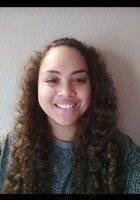Connect with hundreds of tutors like Alexis
Who needs tutoring?
FEATURED BY
TUTORS FROM
- YaleUniversity
- PrincetonUniversity
- StanfordUniversity
- CornellUniversity

Alexis
About Me
I completed MBA in CyberSecurity in 2018. I graduated from the University of Texas at Austin with a BS in Computer Science in May 2014. I am a software engineer during the day and love everything having to do with math, science, and computer science. My reason for wanting to become a tutor outside of my day job is to help educate the minds of the future. Learning outside of the classroom is very important. As a tutor, I look forward to being an engaging educator, as well as an important learning asset for each of my tutees. As an educator, I have experience tutoring many ages and learning levels. I started tutoring in high school with one student and, by word of mouth, received more students. I was a tutor in college for math and computer science. I look forward to working with each student and prepare lessons based on each students individual needs. Please allow me to be a part of your educational experience!
Education & Certifications
Q&A with Alexis
Tutoring Subjects
Connect with a tutor like Alexis
Connect with a tutor like Alexis
Tutors with Similar Experience


